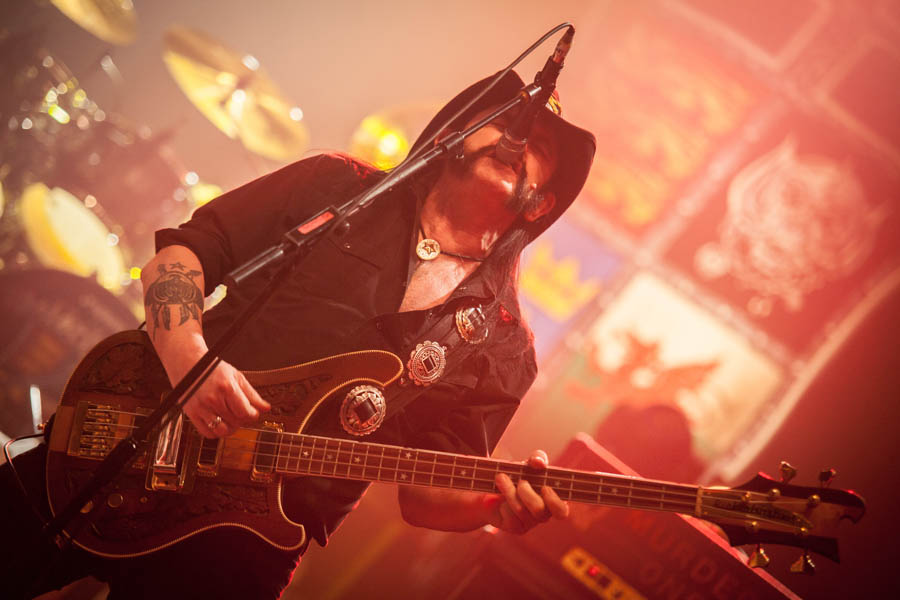Today we found out that Piotr Grudziński, the guitarist from RIVERSIDE, passed away. It’s incredible how many musicians we’ve lost in such a short period of time. Lemmy left us in December, Bowie said farewell in January along with Jimmy Bain from RAINBOW and DIO, and even Christopher Lee, who put out a few metal albums, was gone as of last June.

It got me thinking, it’s getting to the point where we’re going to start losing legends one by one, either to death or simply retirement. That’s just the way it goes. What’s truly depressing about it is that no one really seems to be stepping up to take their place. I mean, who really fits Michael Jackson’s shoes, or Freddy Mercury? Adam Lambert has done a nice job of the QUEEN songs, but he’s nothing more than a tribute in the end. I think the best thing we’ve got is Lady Gaga as Madonna’s pop successor, which isn’t half bad, but that’s one out of how many, in the end?
Why is this happening? Why don’t we have new legends stepping in to take the place of the old ones? I have a few theories:
The Ground is Already Broken
You know how they say that every story has already been told, and new stories are simply different takes on old ones? That’s true of music as well. In the ’70s, THE BEATLES were revolutionary with their sound. Metal and rock as genres were big, scary things to parents and religious folk (keep in mind that this track was considered to be too much for the religious scene at a point), and kids loved to rebel. Nowadays, those big steps to changing music have already been taken and crazier genres are becoming more widely accepted. The kids who grew up in those days are parents now who know for a fact that heavy music doesn’t ruin lives and put you on the streets doing drugs. Hell, there’s Christian metal, whether you know of it (or like it) or not. So perhaps one of the reasons that there don’t seem to be many new legends in the making is that the ground has been broken, and the revolution is over.
Popular Music isn’t Designed to Last
If you look at the pop classics like Michael Jackson, who do you really think would take his place? Justin Bieber? Please. Pop music these days is written by gangs of writers who are hoping to get the right mix of common elements to create a big hit that will make a lot of money. I’m not saying there’s not a lot of effort that goes into these songs, or that all of it is complete trash – far from it. It’s simply the goal of the music and they know what they’re doing. But pop music often isn’t really about the music anymore. It’s kids who want to be famous, and writers who want to make money. There’s not nearly as many Freddy Mercurys out there writing their own “Bohemian Rhapsody” now. Instead, you have Jennifer Lopez with “Booty” – ten or so writers and the extent of the lyrics is essentially, “big, big booty, yeah you got a big booty.” We’ve lost the “November Rain” and “Imagine” songs and they’ve been replaced with one-off, forgettable, catchy songs that make money, fast. And these bands, no matter how long they last or how catchy they are, will never fall into legend the way the old ones did.
We’re not as picky as listeners or reviewers either. Back in the ’70s, only the cream of the crop ever got to taste the sweet nectar of being on the cover of the Rolling Stone. Now, anyone with a popular hit can and will be there eventually. Even the highest pedestals musicians could reach have become common achievements. There aren’t any really meaningful points to achieve because anyone with a popular hit can achieve them.
Nostalgia Sells Better than New Bands
Have you noticed how labels keep releasing and re-releasing collections and best-ofs of bands from the ’70s, ’80s, and ’90s? That’s because the legends still sell better than new music. People either still appreciate the music or love the nostalgia. METALLICA hasn’t been in their prime in decades and they still sell out stadiums. PINK FLOYD is still topping charts with collections, while no one gave a shit about “The Endless River.” IRON MAIDEN is still going strong after fourteen studio albums, while newer bands die out after just one. The labels do probably pour some of this money back into the new bands, naturally, hoping that one of them will stick, but the truth is, there will probably never be another PINK FLOYD or ROLLING STONES or JUDAS PRIEST, which goes back to my first point. These classics are timeless, getting passed down from the kids who listened to them when they were new, perhaps playing them to their children, who grow up with it rather than discovering it, and the cycle continues. New bands can’t quite compete with the legends in this sense.
Music is Both More and Less Accessible
Genres have changed a lot over the years. Think about country music. Country was a style for the country folk, hence the name. It appealed to the cowboys and outdoorsy folk, the people who worked on the land with their hands. Nowadays the number of people who ride horses and were raised on farms is significantly less. So instead of fantastic old country songs like “Fishing in the Dark” by the NITTY GRITTY DIRT BAND, you have – and I shudder every time I think about this – “Honky Tonk Badonkadonk” by Trace Adkins, who should be ashamed of himself because this is easily one of the worst songs ever written. Yet it makes sense… to sell records, country had to shift into the pop field because people didn’t understand it anymore. So now we’ve lost BROOKS ‘N’ DUNN but we’ve gained Taylor Swift, and the only reason she gets to call herself country is because some of her songs have a steel guitar in them. The genre had to open up to different listeners because the original culture that created it is fading.
The same goes for metal. When bands like METALLICA and IRON MAIDEN were breaking ground, there weren’t ten thousand subgenres – it was just heavy metal. Garage rock that got noticed. So these big bands got themselves a ton of fans, both massively loyal and casual. Nowadays you’ve got doom metal, Viking metal, Viking-folk metal, pagan metal, death metal, black metal, extreme metal, thrash metal, gamer metal, melodic metal, symphonic metal, power metal, Gothic metal… the list just never ends. There are so many niche bands out there that they’ll get themselves some very loyal fans, but they’ll never have the reach of the pioneers of the genre. Nowadays, bands are so specified that they’ll never be accessible on a major scale anymore. Yet, if bands broaden their sound to much, they’re no longer ground-breaking. They can’t win.
Attention Spans are Shortening
It does seem like in this technological world, that songs have to work lot harder to impress. You don’t go to wait in line at the record store to buy the new single from your favorite band after waiting in agony for months for the release, and then invite all of your friends over for a listening party. Now you can just throw a new single or album on Spotify or Youtube and if it doesn’t immediately catch your attention, you move on to the next band or album. You don’t have to sit and pay attention to a vinyl because you now have the power to instantly skip tracks. You don’t get to hear new bands on the radio anymore because you have playlists on your phone that you can listen to. There are so many bands out there with so many albums that you could be listening to new music for every second of every day and still never scratch the surface of everything that’s out there. With so much music available at the click of a mouse, listeners can afford to be picky. They don’t need to be impressed because the next band might do what the last one failed to accomplish.
The music industry is undergoing a massive revolution these days that doesn’t seem to be slowing any day soon. It does seem though, that at least for the foreseeable future, we’re probably not going to be getting many legends to add to the rosters. It’s truly a shame that we’ll never see the old drama of heavy music, or the authenticity of country, or the pure epic of the true old pop, but that is the way it goes. It’s really hard to say whether or not we’ll ever truly replace the legends, and if we do, if they’ll ever have the caliber or duration of their predecessors. But at least we can be assured that those legends, even when gone, will not be forgotten.
Written by Bear Wiseman
Musicalypse, 2016
OV: 7964
Recent posts
[recent_post_carousel design=”design-1″]





